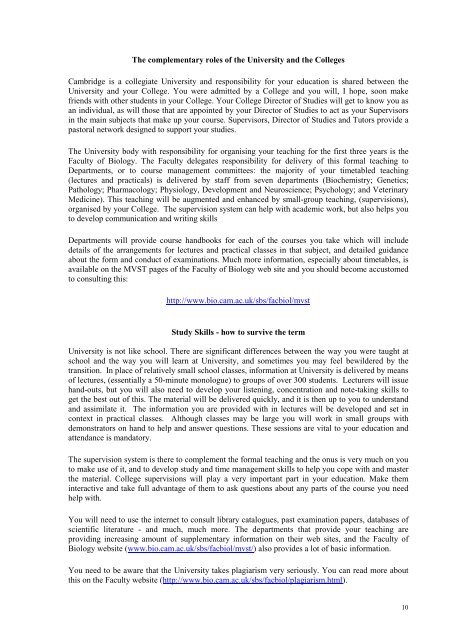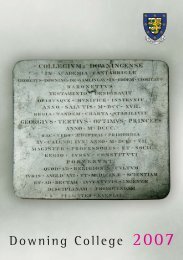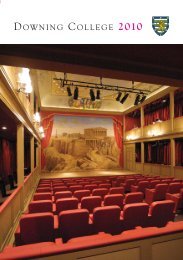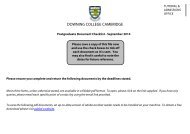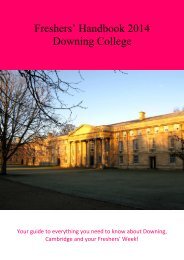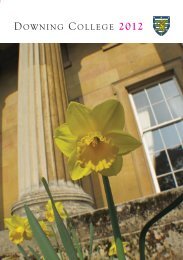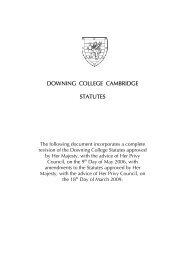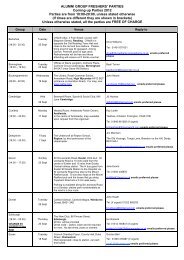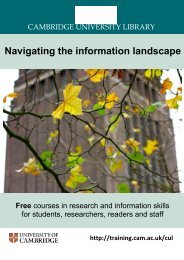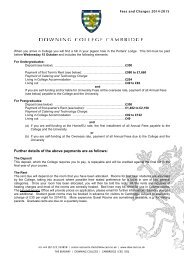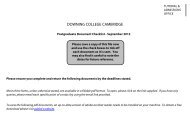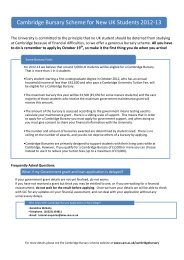veterinary students handbook the first two years - Downing College
veterinary students handbook the first two years - Downing College
veterinary students handbook the first two years - Downing College
Create successful ePaper yourself
Turn your PDF publications into a flip-book with our unique Google optimized e-Paper software.
The complementary roles of <strong>the</strong> University and <strong>the</strong> <strong>College</strong>s<br />
Cambridge is a collegiate University and responsibility for your education is shared between <strong>the</strong><br />
University and your <strong>College</strong>. You were admitted by a <strong>College</strong> and you will, I hope, soon make<br />
friends with o<strong>the</strong>r <strong>students</strong> in your <strong>College</strong>. Your <strong>College</strong> Director of Studies will get to know you as<br />
an individual, as will those that are appointed by your Director of Studies to act as your Supervisors<br />
in <strong>the</strong> main subjects that make up your course. Supervisors, Director of Studies and Tutors provide a<br />
pastoral ne<strong>two</strong>rk designed to support your studies.<br />
The University body with responsibility for organising your teaching for <strong>the</strong> <strong>first</strong> three <strong>years</strong> is <strong>the</strong><br />
Faculty of Biology. The Faculty delegates responsibility for delivery of this formal teaching to<br />
Departments, or to course management committees: <strong>the</strong> majority of your timetabled teaching<br />
(lectures and practicals) is delivered by staff from seven departments (Biochemistry; Genetics;<br />
Pathology; Pharmacology; Physiology, Development and Neuroscience; Psychology; and Veterinary<br />
Medicine). This teaching will be augmented and enhanced by small-group teaching, (supervisions),<br />
organised by your <strong>College</strong>. The supervision system can help with academic work, but also helps you<br />
to develop communication and writing skills<br />
Departments will provide course <strong>handbook</strong>s for each of <strong>the</strong> courses you take which will include<br />
details of <strong>the</strong> arrangements for lectures and practical classes in that subject, and detailed guidance<br />
about <strong>the</strong> form and conduct of examinations. Much more information, especially about timetables, is<br />
available on <strong>the</strong> MVST pages of <strong>the</strong> Faculty of Biology web site and you should become accustomed<br />
to consulting this:<br />
http://www.bio.cam.ac.uk/sbs/facbiol/mvst<br />
Study Skills - how to survive <strong>the</strong> term<br />
University is not like school. There are significant differences between <strong>the</strong> way you were taught at<br />
school and <strong>the</strong> way you will learn at University, and sometimes you may feel bewildered by <strong>the</strong><br />
transition. In place of relatively small school classes, information at University is delivered by means<br />
of lectures, (essentially a 50-minute monologue) to groups of over 300 <strong>students</strong>. Lecturers will issue<br />
hand-outs, but you will also need to develop your listening, concentration and note-taking skills to<br />
get <strong>the</strong> best out of this. The material will be delivered quickly, and it is <strong>the</strong>n up to you to understand<br />
and assimilate it. The information you are provided with in lectures will be developed and set in<br />
context in practical classes. Although classes may be large you will work in small groups with<br />
demonstrators on hand to help and answer questions. These sessions are vital to your education and<br />
attendance is mandatory.<br />
The supervision system is <strong>the</strong>re to complement <strong>the</strong> formal teaching and <strong>the</strong> onus is very much on you<br />
to make use of it, and to develop study and time management skills to help you cope with and master<br />
<strong>the</strong> material. <strong>College</strong> supervisions will play a very important part in your education. Make <strong>the</strong>m<br />
interactive and take full advantage of <strong>the</strong>m to ask questions about any parts of <strong>the</strong> course you need<br />
help with.<br />
You will need to use <strong>the</strong> internet to consult library catalogues, past examination papers, databases of<br />
scientific literature - and much, much more. The departments that provide your teaching are<br />
providing increasing amount of supplementary information on <strong>the</strong>ir web sites, and <strong>the</strong> Faculty of<br />
Biology website (www.bio.cam.ac.uk/sbs/facbiol/mvst/) also provides a lot of basic information.<br />
You need to be aware that <strong>the</strong> University takes plagiarism very seriously. You can read more about<br />
this on <strong>the</strong> Faculty website (http://www.bio.cam.ac.uk/sbs/facbiol/plagiarism.html).<br />
10


